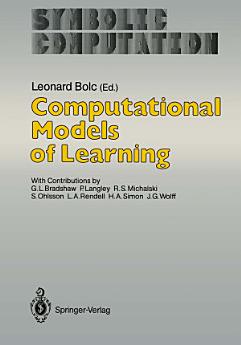Computational Models of Learning
Leonard Bolc
ธ.ค. 2012 · Springer Science & Business Media
eBook
208
หน้า
reportคะแนนและรีวิวไม่ได้รับการตรวจสอบยืนยัน ดูข้อมูลเพิ่มเติม
เกี่ยวกับ eBook เล่มนี้
In recent years, machine learning has emerged as a significant area of research in artificial intelligence and cognitive science. At present, research in the field is being intensified from both the point of view of theory and of implementation, and the results are being introduced in practice. Machine learning has recently become the subject of interest of many young and talented scientists whose bold ideas have greatly contributed to the broadening of knowledge in this rapidly developing field of science. This situation has manifested itself in an increasing number of valuable contributions to scientific journals. However, such papers are necessarily compact descriptions of research problems. Computational Models of Learning supplements these contributions and is a collection of more extensive essays. These essays provide the reader with an increased knowledge of carefully selected problems of machine learning.
ให้คะแนน eBook นี้
แสดงความเห็นของคุณให้เรารับรู้
ข้อมูลในการอ่าน
สมาร์ทโฟนและแท็บเล็ต
ติดตั้งแอป Google Play Books สำหรับ Android และ iPad/iPhone แอปจะซิงค์โดยอัตโนมัติกับบัญชีของคุณ และช่วยให้คุณอ่านแบบออนไลน์หรือออฟไลน์ได้ทุกที่
แล็ปท็อปและคอมพิวเตอร์
คุณฟังหนังสือเสียงที่ซื้อจาก Google Play โดยใช้เว็บเบราว์เซอร์ในคอมพิวเตอร์ได้
eReader และอุปกรณ์อื่นๆ
หากต้องการอ่านบนอุปกรณ์ e-ink เช่น Kobo eReader คุณจะต้องดาวน์โหลดและโอนไฟล์ไปยังอุปกรณ์ของคุณ โปรดทำตามวิธีการอย่างละเอียดในศูนย์ช่วยเหลือเพื่อโอนไฟล์ไปยัง eReader ที่รองรับ






